 A CAREER IN HOTEL MANAGEMENT & HOSPITALITY GIVES YOU THE OPTION TO WORK ANYWHERE IN THE WORLD!
A CAREER IN HOTEL MANAGEMENT & HOSPITALITY GIVES YOU THE OPTION TO WORK ANYWHERE IN THE WORLD!
Whether you just want to expand your knowledge, or want to move into a hotel management career, this course provides a solid foundation for you to get ahead within the hospitality industry. Discover ALL aspects of hotel management and how to organize and manage the various sections within a hotel, resort, or similar facility.
This is a broad based and basic training to work in hospitality, accommodation, hotels, motels or resorts. It's a popular and substantial starting point for anyone in the hotel industry.
Duration: 100 hours
COURSE STRUCTURE
There are 9 lessons as follows:
1. Introduction: Scope and Nature of Hotel Management
-
Role of the hotel Industry
-
Classifying different Types of Hotels
-
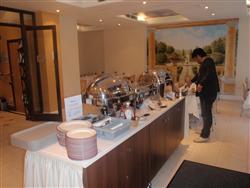
Accommodation Classification and Rating Schemes (eg. Star system,
-
Scope of Industry
-
Accommodation Products
-
Role of the Accommodation Manager
-
The Client
-
Scale …Size of Establishment
-
Economy of Scale
-
Growth
-
Why Hotels May Wish to Expand
-
Risk Spreading
-
Franchising
-
Hotel Management Semantics
-
Planning
-
Objectives and Goals
-
Types of Plans
-
Policy; types, determination and sources
-
Strategy
2. Organisation of the Hotel Workplace
-
Introduction
-
Organisation of land, labour, capital
-
Nature and Purpose of Organisation
-
Mechanistic View of Organisation
-
Human Relations View of Organisation
-
Systems Approach to Organisation
-
Organisation Structure in Hotels
-
Informal Structure
-
Hotel Organisation; Front Office, Maintenance, Housekeeping, etc.
-
Organising the Housekeeping Department
-
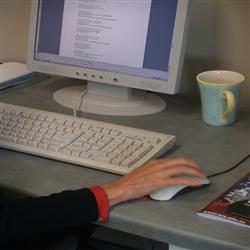
Organising the Maintenance Department
-
Organising the Front Office
-
The Provision of Accommodation
-
Planning
3. Staff Management in Hotels
-
Areas of Management
-
Food and Beverage Management
-
Managing Front Office Operations
-
Housekeeping Management
-
Human Resources
-
Supervision
-
Marketing and Sales
-
Accounting and Finance
-
General Management
-
Quality Leadership & Management
-
Understanding Hospitality Law
-
Charting relationships between people working together
-
Line Relationships
-
Line and Staff Relationships
-
Function or Specialist Relationships
-
(UK-resized.jpg)
Project Organisation Structure
-
Communication and Coordination
-
Staff Management
-
The Personnel Function
-
Objectives of Personnel Management
-
Scope of Personnel Management
-
Leadership
-
Staff Motivation
-
Authority
-
Career Development
4. Control Systems
-
Sources and Storage of Information; internal and external
-
Creating and Maintaining Information
-
What to Measure
-
Interpretation
-
Selectivity
-
Accountability and ability to control
-
Creating Control Systems
-
Maintenance of Control Systems
-
Types of Control;
-
Production control
-
Quality control
-
Sales control
-
Labour utilisation control
-
Materials control
-
Maintenance control
-
Financial control
-
Budgeting
-
Setting Standards for Corrective Action
-
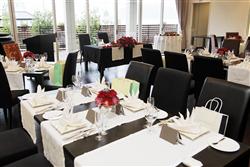
Work Study
5. Front Desk Management (Reception)
6. Servicing Rooms and General Cleaning
-
Scope and Nature of Housekeeping
-
Service Equipment
-
Hire or Purchase of Equipment
-
Linen; purchase or hire
-
Advantages and disadvantages of hire
-
Choosing Fabrics
-
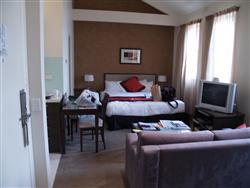
Comparing Fabric Qualities
-
Classification of Fabrics; natural and man made
-
Fabric Flammability
-
Linen Room Organisation
-
Linen Room Staff
-
Environmental Considerations in Hotel Management
-
Workplace Health and Safety
-
Advertising Sustainability
7. Building and Facility Maintenance
-
Expertise required
-
Maintenance Scope and Nature
-
Service Agreements; lifts, boilers, electrical, etc.
-
Maintenance Records
-
Daily, Periodic and Preventative Maintenance
-
Frequent Maintenance Problems; Dampness, Faulty Roofs, gutters, down pipes, Water pipes, Condensation
-
Electrical Problems
-
Safety
-
Furniture Maintenance
-
Maintaining Fittings
-
Managing Maintenance
-
Maintenance Checklists
-
Equipment Cleaning
-
Building Maintenance, general tasks
-
Health and Safety Maintenance
-
Repairs
-
Toilets and Locker Rooms
8. Activities Management
-
Introduction
-
In House Services
-
Tour Desk
-
Guest Information Services
-
Leisure Facilities
-
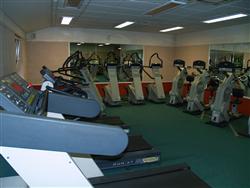
Health Clubs
-
Gymnasiums; equipment, layout, maintenance, repairs, over use, etc
-
Managing Exercise Programs; classes, screening participants,
-
Managing Swimming, Spa and Sauna Facilities
-
Pool and Spa Maintenance
-
Sauna and Steam Room Maintenance
-
Common Pool Problems
-
Scope of Leisure Activities
-
Children’s Play Program Activities
-
Planning Recreation Activities
-
Hints for Leading Activities
-
Tourism Services in Hotels
-
Scope of Tourism Services
9. Food Service
-
Scope of Food service
-
Types of Food Service; Room Service, Bar, Lobby, Coffee Shop, Restaurant
-
Kitchen Design
-
Kitchen Equipment
-
Criteria for Selecting Kitchen Equipment
-
Equipment Inventory
-
Reception
-
Storage
-
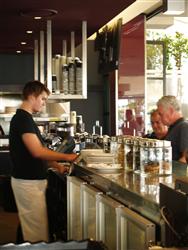
Food Preparation
-
Cooking
-
Service Facilities
-
Cleaning
-
Waste Disposal
-
Food Service Management
-
Menu and Production Planning
-
Division of Food Service Activities
-
Management and Supervision
-
Kitchen Production Methods; Table d’Hote, A la Carte, Call Order, etc
-
Waiting Skills, Carrying plates, Holding a service spoon and fork, Using a Silver Salver, Carrying glasses, etc
-
Waiter interaction with staff and customers
-
The Menu
-
Types of Menu
-
Beverage Lists
-
Non Alcoholic Drinks
-
Food Purchasing
-
Storing Vegetables
-
Food Preservation
-
Dairy Products
COURSE AIMS
On successful completion of the course you should be able to do the following:
- To understand the range of hotels in operation and their management policies
- To understand management structures and the way in which the workplace is organised.
- To draw a team of professional staff together to ensure quality delivery of these services requires a tremendous amount of skill and organisation.
- To gain an understanding of the complexity of hotel management consider the following areas of management:
- To understand the importance of maintaining an overall system of control within a hotel
- To develop knowledge of the complexities and management issues relating to front desk operations.
- To develop knowledge of equipment and understanding of linen available
- To implement facilities management systems
- To implement and manage an activities service
- To understand a range of food services offered in the hotel industry
WHAT THIS COURSE COVERS
Here are just some of the things you will be doing:
- Interview a manager or senior staff at a local hotel to enquire about their set up and structured policies.
- Find out about the organisational structure of either one department of the hotel, or the whole hotel.
- Observe how managers give direction/orders/requests to staff.
- Discuss the procedures which should be followed when creating and maintaining a budgetary control system.
- Observe and evaluate the Front Desk management of a selected hotel, commenting on the style of communication used, efficiency of the staff and your suggestions for improvement.
- Discuss room service and room standards (ie cleanliness, etc.) in hotels and other guest accommodation, with three different colleagues or friends to identify areas of concern.
- Visit a hotel in order to develop a checklist for conducting maintenance inspections.
- Compare guest services (including fitness and health services) fat two different hotels or chains in the same region
- Compare the different food services (including range/scope of services, times of service, types of food and beverage, prices, and quality of serviced) at three hotels in the same area.
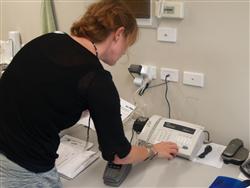
Managing an Accommodation Front Desk
As in all business the front desk or reception is the window to an accommodation business. The customer’s overall impression of a hotel will be formulated by the way in which they are received at the front desk.
A front desk operator needs to be enthusiastic and enjoy working with the public, tactful and courteous, professional and mature, and able to manage stress well. Also have good communication and people-skills, be well-organized and responsible.
Duties and responsibilities vary depending on the hotel but usually include:
-
Assign Rooms
-
Assign guests service attendants and escorts as applicable
-
Answer questions re hotel services
-
Accept and confirm reservations usually computerised
-
Answer telephones and correspondence
-
Deal with daily administration paperwork i.e. guest accounts, receipts and vouchers
-
Handle internet booking
It is the responsibility of management to ensure that the front desk operator has the correct up-date knowledge and training required of this position.
HouseKeeping
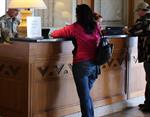 The basic housekeeping function is to prepare guest rooms for occupation, after a previous occupant has left, and to service the rooms. Housekeeping is usually also responsible for cleaning public areas of the hotel, though some hotels use other staff for this function. The appearance, state and location of the rooms are of central concern to most guests, who usually spend around 1/3 of their stay in their rooms. Therefore, hotels give special attention to achieving a pleasing décor that will have general or broad appeal, but not consume too much of the hotel’s budget. Therefore, furniture, linen, curtains and other room supplies must be durable and sufficiently attractive.
The basic housekeeping function is to prepare guest rooms for occupation, after a previous occupant has left, and to service the rooms. Housekeeping is usually also responsible for cleaning public areas of the hotel, though some hotels use other staff for this function. The appearance, state and location of the rooms are of central concern to most guests, who usually spend around 1/3 of their stay in their rooms. Therefore, hotels give special attention to achieving a pleasing décor that will have general or broad appeal, but not consume too much of the hotel’s budget. Therefore, furniture, linen, curtains and other room supplies must be durable and sufficiently attractive.
Most times, the Housekeeping department is responsible for servicing guest room, and these services can include handling guest laundry, baby sitting, room service, and special services required by guest. Housekeeping services might also include tending floral arrangements, providing return or special guest with fresh fruit or flowers, providing first aid, handling lost property. This puts housekeeping staff in frequent contact with guests, and in this way as well, an important part of customer service. In some countries, housekeeping staff (and indeed, all service personnel) are expected to be more or less ‘invisible’, and not to interact with guests unless required, so as to respect guest privacy, and their special status as guests. In other countries, housekeeping staff are encourage to greet guests as they pass, to smile, and to tend to guests more personally. Either way, housekeeping staff are a critical and valuable component of the hotel, and the smooth operation of different areas of the hotel centres around their contribution.
In general, housekeeping departments are managed by separate managers. In some hotels, these managers are people who have worked in different capacities in the housekeeping department, which gives them a deeper appreciation of what needs to be done and how many staff, and how much time, are needed to achieve them. Housekeeping must be kept informed of bookings and projected occupation rates in order to coordinate its activities so that rooms are cleaned and ready for occupancy when needed. In all cases, though, the housekeeping department is in almost continual communication with the front office, and may interact closely with other departments such as maintenance, quality control, sales and marketing.
The main records kept by housekeeping are:
-
Arrival and departure lists
-
Notifications from front officer
-
Housekeeping’s own room status report
-
Records of the other serviced provided by housekeeping
-
Supply and store room records
-
Housekeeping staffing schedules.